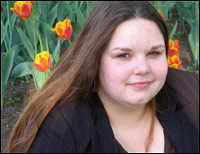Next: In all corners of the world
Posted Jun. 15/07
According to the opening sequence of Law & Order, “in the criminal justice system, the people are represented by two separate yet equally important groups: the police who investigate crime and the district attorneys who prosecute the offenders.” Beyond the television triumvirate of criminals, police and lawyers are the frontline workers who deal with offenders and victims, and the researchers, strategists and policy analysts who shape the system.

- Jessie Rylett’s placement with Correctional Service Canada taught her about the criminal justice process.
At Carleton’s Institute of Criminology and Criminal Justice, students have the opportunity to explore these diverse careers and apply their theoretical knowledge through an optional field placement program.
“The placement opened my perception about criminology,” says Kim Chorkawy, a third-year student whose interests are in law and economics. “Competition law enforcement was not an area that I had ever considered. I hadn’t even heard of the Competition Bureau before I saw it in the field placement handbook.”
After assisting competition officers in their case investigations—by conducting witness interviews, writing their statements, and handling, analysing and processing evidence— Chorkawy has been inspired to take some new classes. “Working at the Bureau really sparked my interests and improved my legal research and writing abilities.”
After 13 years as the field placement coordinator for the criminology and criminal justice program, Cheryl Stout isn’t surprised that Chorkawy, and many students like her, find the placement to be eye opening.
“The placement is an opportunity for students to find out what they are interested in,” she says. “Criminology and criminal justice aren’t well defined employment streams, so this is a chance to confirm or redirect areas of interest, and put theory into practice.”
In place for more than 30 years, the field placement option is competitive: 80 students with the top grade point averages are accepted for placement in the pool of placement opportunities. Over the years, Stout has seen trends shift between front-line placements and policy and research, and receives more frequent requests for criminal law and forensics placements.
Regardless of the area of interest, all placements help students develop professional skills and integrate theoretical knowledge in a practical setting. A wide range of placement opportunities are available, including frontline work with adult and youth offenders through police, crown attorneys and lawyers, and with researchers and policy analysts in criminal justice and crime prevention.
“I’ve been here long enough to see former students supervising current students,” says Stout, who retires at the end of June. Getting to know students and seeing the opportunities to which their placements expose them has been a highlight of her job. “The placement is a wonderful mentorship and provides great networking opportunities for the students. They are great ambassadors for Carleton.”
“The placement was the most valuable piece of my education. It allowed me to apply the theory and knowledge that I gained in the classroom to real-life experiences,” says Jessie Rylett, BAHons/06, who is now completing her applied masters of criminology at the University of Ottawa. “The ability to network with people was also a valuable asset: letting people know the type of work you can do is crucial, especially within a government agency.”
Rylett’s placement in offender programs and reintegration, violence prevention and community reintegration at Correctional Service Canada (CSC) led to her being hired through the federal student work experience program. She hopes that will bridge into a position once she finishes school.
Overall, I had a lot of data collection and analysis projects while on my field placement, as well as a significant amount of work revising and producing training documents for program facilitators,” says Rylett. “I have always been interested in the policy and research side of corrections, so CSC was the logical placement for me.”
Simon Baldwin, who is concentrating in sociology with a minor in psychology, hopes his placement with the National Youth Services sector of the RCMP will lead to full-time employment when he graduates in December. Already hired on for the summer, Baldwin is working on the School Action for Emergencies Plan.
“As a youth/crime prevention strategist, I researched youth issues, completed statistical analysis, developed and compiled educational lesson plans and resources for youth officers to use in schools,” says Baldwin of his 16 hour per week placement. “The RCMP placement allowed me to help youth on a larger scale and it incorporated all my interests in youth, criminality, law enforcement, social development and addictions.”
The final judgement? “The placement brought together everything that I’ve been learning in school and allowed me to apply it,” says Baldwin. “My experience could not have been better!”